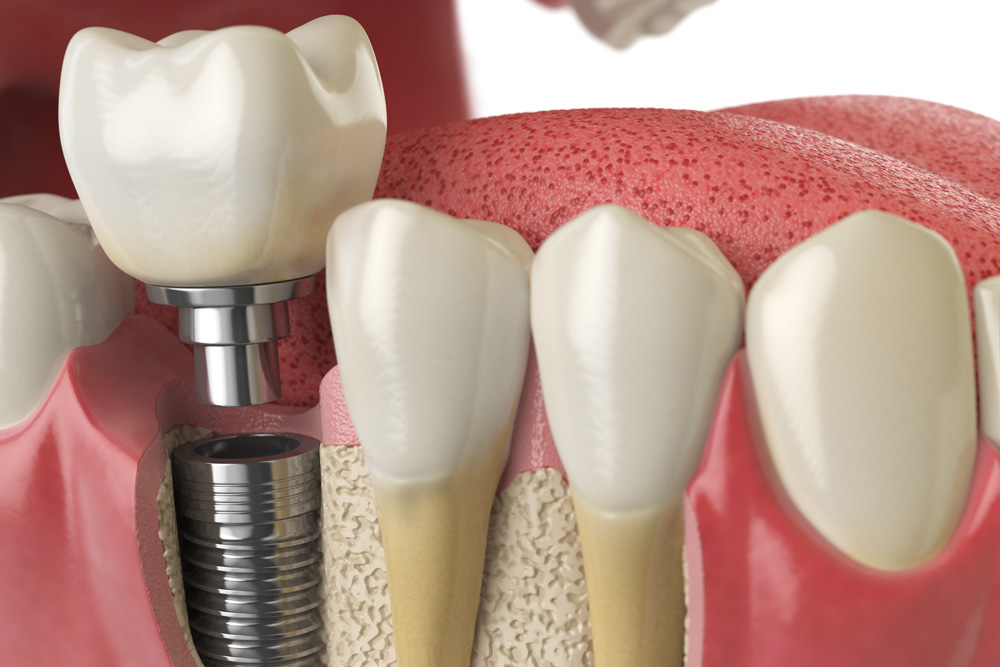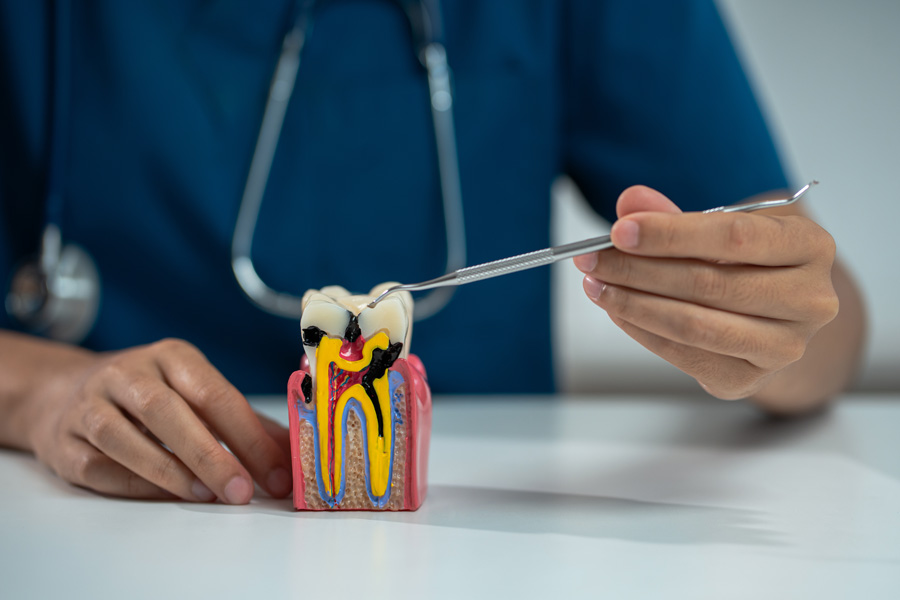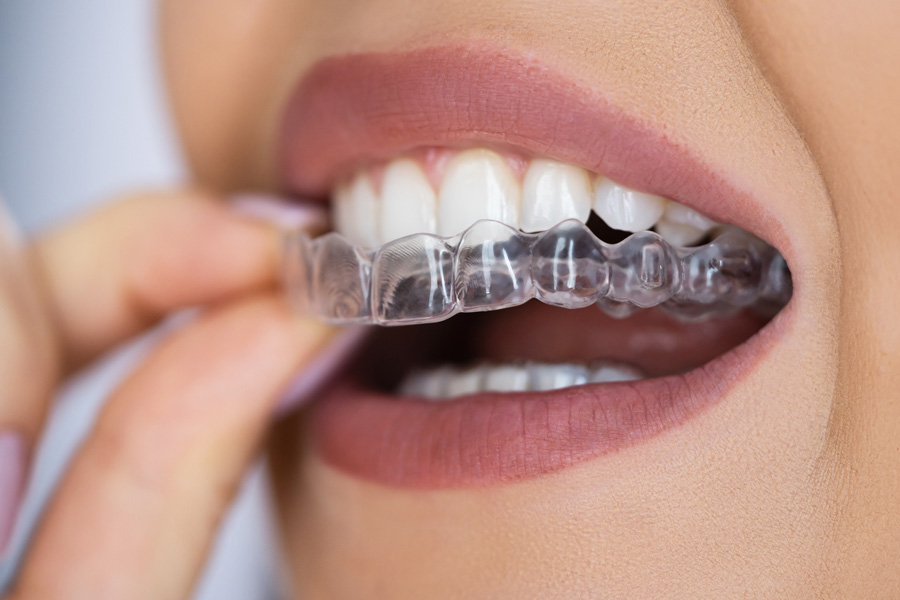
Why Your Family Needs One Dental Home for Everyone
September 30, 2025
Invisalign for Adults
November 26, 2025
Dental Implants in Western Pennsylvania
Your Guide to Permanent Tooth Replacement
You catch yourself doing it again. Chewing only on one side of your mouth. Smiling with your lips pressed tight in photos. Avoiding corn on the cob at summer barbecues. That gap where your tooth used to be has changed everything about how you eat, speak, and behave in public.
However you lost that tooth, you’re not alone. Millions of Americans are missing one or more teeth, and that empty space affects far more than your appearance. At Modern Dental Associates, we understand the physical discomfort and emotional toll of tooth loss. We also know that dental implants can transform your life, giving you back the confidence to smile, laugh, and enjoy your favorite foods without hesitation.
The Hidden Costs of Missing Teeth
Did you know that missing teeth create more problems than that missing space your tongue can feel or that obvious gap in your smile?
Physical Impact
When you lose a tooth, you lose more than what’s visible—you also lose the root that stimulates your jawbone with every chew. Without that stimulation, your jawbone begins to deteriorate through bone resorption, often within months. This bone loss can change your face’s shape, cause remaining teeth to shift, and make nutritious foods like raw vegetables and lean meats difficult to chew, affecting your overall health.
Emotional and Social Impact
Both at home and out in the world, your smile helps convey your positive energy and is a big part of first impressions.
Many of our patients tell us they’ve stopped smiling in photos. They cover their mouths when they laugh. They feel self-conscious during job interviews or business meetings. Some have even avoided social situations altogether because of missing teeth.
One of our patients, who shared her experience in a testimonial, talked about how her confidence returned after getting treatment at Modern Dental Associates. Andrea Beneke said, “Dr. Parry took time to really weigh my options, talk to me, and make suggestions. I am truly grateful for the experience and see how he makes me smile with confidence again.”
Long-term Health Consequences
The health impacts extend beyond your mouth. Difficulty chewing can lead to digestive issues, as you’re not able to properly break down food before swallowing. The remaining teeth bear extra pressure from compensating for the missing tooth, increasing their risk of damage. And the gaps in your smile create new places for bacteria to accumulate, raising your risk of gum disease and future tooth loss.
Altogether, these reasons add up to more than just a troublesome gap in your smile. Tooth loss can be a crucial health decision.
What Are Dental Implants? Understanding the Solution
Dental implants are the closest you can get to replacing your natural teeth. Unlike dentures that sit on top of your gums or bridges that require grinding down adjacent healthy teeth, implants work just like your natural tooth roots.
Implants Come in Three Parts
The implant post: A small titanium or zirconia screw surgically placed into your jawbone that serves as an artificial root. Titanium naturally fuses with bone through osseointegration, creating a foundation as strong as your original tooth root.
The abutment: A connector piece that links the implant post to your new tooth.
The crown is the visible part: The visible artificial tooth, custom-made to match your natural teeth in color, shape, and size, blending seamlessly with your smile.
How They Work
After the implant post is placed in your jawbone, your body begins the osseointegration process. Over several weeks to months, your bone cells grow and attach themselves to the titanium surface. This creates an incredibly strong bond. Pproperly placed and cared-for implants can be even more stable than natural tooth roots.
Once the implant has fully integrated with your bone, the abutment and crown are attached. The result is a tooth that looks, feels, and functions just like your natural teeth. You can eat whatever you want, as well as brush, floss, and smile with complete confidence.
Types of Implant Solutions
Dental implants are versatile and can address various situations:
Single tooth replacement is ideal when you’ve lost one tooth. The implant replaces just that tooth without affecting your healthy adjacent teeth.
Multiple tooth replacement uses several implants to support a bridge, replacing multiple missing teeth without requiring an implant for each individual tooth.
Full mouth restoration can replace all your upper or lower teeth using as few as four to six strategically placed implants per arch. This option, often called “All-on-4” or “All-on-6,” provides a complete set of fixed teeth.
Implant-supported dentures use two to four implants to secure a denture in place. Unlike traditional dentures that can slip and slide, implant-supported dentures stay firmly in position while still being removable for cleaning.
Why Dental Implants Work So Well
Dental implants offer special advantages other procedures cannot match:
Preserve your jawbone: Provide stimulation that maintains bone density and prevents facial changes
Protect adjacent teeth: Implants stand independently without requiring healthy teeth to be ground down for bridges
Feel natural: Anchored in bone, they don’t move, click, or create gum pressure; patients often forget which teeth are implants
Restore full function: Bite into apples, enjoy steak, eat sticky foods without restrictions
Last decades: With proper care, many last 20-30+ years or a lifetime, making them cost-effective long-term
Your Dental Implant Journey at Modern Dental Associates
Understanding the process helps reduce anxiety about the unknown. Here’s what to expect when you choose dental implants at Modern Dental Associates.
Step 1: Consultation and Planning
Your journey begins with a comprehensive evaluation. Our team will examine your mouth, take detailed X-rays, and use digital scanning technology to assess your bone structure and identify the precise locations of nerves and sinuses.
Wel discuss your medical history, current medications, and any conditions that might affect healing. We’ll talk about your goals—what you want to achieve with your dental implants—and explain whether you’re a good candidate for the procedure.
This consultation includes a frank discussion about cost and insurance coverage. We believe in complete transparency, so you’ll know exactly what to expect financially before we begin treatment. We also offer flexible payment plans to make implants accessible for patients who want this life-changing treatment.
Step 2: Pre-Treatment (As Needed)
Not everyone needs preparatory procedures, but they’re sometimes necessary to ensure the best possible outcome.
Bone grafting may be recommended if your jawbone has deteriorated due to long-term tooth loss or other factors. During this procedure, bone material is placed in the area where the implant will go. Over several months, this graft integrates with your natural bone, creating a strong foundation for the implant.
Sinus lift procedures are sometimes necessary for upper back teeth. The maxillary sinuses sit just above these teeth, and bone loss in this area can leave insufficient bone height for an implant. A sinus lift gently raises the sinus floor and adds bone beneath it, creating the space needed for implant placement.
While these additional steps extend your treatment timeline, they dramatically increase the likelihood of long-term implant success. We take whatever time is necessary to do the job right.
Step 3: Implant Placement
On the day of your surgery, we’ll make sure you’re comfortable. Modern Dental Associates offers sedation options ranging from local anesthesia to deeper sedation for patients with dental anxiety. Many patients, like Marissa Williams, have shared how our approach to patient comfort made all the difference. She said, “I have terrible dental anxiety and they made sure to give me time to breathe when I needed it and talked me through everything. They made me very comfortable.”
The surgical procedure itself is straightforward. Your oral surgeon makes a small incision in your gum to expose the bone. Using specialized instruments, they create a precise space in the bone and place the implant post. A healing cap is placed over the implant, and the gum tissue is sutured closed.
Most patients are surprised by how manageable the procedure is. While you’ll need to rest for the remainder of that day, many people return to work the next day.
Step 4: Osseointegration Period
Now comes the waiting period, and it’s the most crucial phase of the entire process. Over the next two to six months, your bone grows around the implant, fusing with it to create a permanent anchor.
During this time, you’ll maintain your regular oral hygiene routine for your remaining teeth. If your missing tooth is visible when you smile, we can provide a temporary tooth replacement to maintain your appearance.
This healing period requires patience, but it’s the key to the implant’s success.
Step 5: Abutment and Crown Placement
Once osseointegration is complete, you’ll return for a minor procedure to attach the abutment. This connector post protrudes slightly above the gumline, providing the base for your crown.
After your gums heal around the abutment (typically two weeks), we’ll take digital impressions of your teeth and bite. These impressions are sent to a dental laboratory, where skilled technicians craft a custom crown designed specifically for you.
When your crown is ready, you’ll return for the final step. The crown is attached to the abutment, completing your new tooth. This appointment is exciting—it’s when you finally see your complete, restored smile.
Enjoying Your New Smile
From this point forward, your implant becomes a fully functional part of your mouth. You can eat whatever you want, brush and floss normally, and smile with complete confidence. Many patients tell us they forget which tooth is the implant because it feels so natural.
Addressing Your Concerns About Dental Implants


We hear certain questions from almost every patient considering implants. Let’s address the most common concerns directly.
“Will It Hurt?”
This is usually the first question people ask, and it’s completely understandable. Here’s the truth: the procedure itself should not be painful because you’ll receive anesthesia that completely numbs the treatment area. If you have serious dental anxiety, we can offer multiple sedation options.
After the surgery, you may experience some discomfort, swelling, or bruising. However, most patients report that the discomfort is less than they expected. Over-the-counter pain medications typically provide adequate relief. Any discomfort usually peaks within the first few days and steadily improves after that.
“What About Cost?”
No way around it, cost is a legitimate concern. Dental implants represent a significant investment in your oral health—typically several thousand dollars per tooth, depending on your specific needs.
Many dental insurance plans provide at least partial coverage for implants, particularly if tooth loss resulted from an accident or injury. Our office staff works with insurance companies regularly and can help you understand your coverage and maximize your benefits.
We also offer flexible payment plans that allow you to spread the cost over time, making this life-changing treatment accessible. While cost concerns are legitimate, don’t let them stop you from having the conversation. There’s no hard sell here; just a down to earth conversation about whether dental implants are right for you.
“What If Something Goes Wrong?”
Dental implant surgery has a very high success rate of 90-95%, which is actually one of the highest success rates among any dental procedure. Of course, all surgical procedure carry some risk.
The most common complication is implant failure, where the implant doesn’t properly fuse with the bone. This is relatively rare and most often occurs in patients who smoke or have uncontrolled diabetes. If an implant fails, it can typically be removed and replaced after the area heals.
Infection is another potential complication, though it’s uncommon with proper surgical technique and post-operative care. Nerve damage and sinus problems are rare but possible risks for certain implant locations.
In all cases, choosing an experienced implant dentist dramatically reduces these risks. Modern Dental Associates’ oral surgeons have undergone extensive training and have performed hundreds of successful implant procedures. Our state-of-the-art technology, including detailed imaging and surgical planning, ensures precise implant placement.
We also provide thorough aftercare instructions and closely monitor your healing. If any concerns arise during your recovery, we’re here to address them promptly.
Life After Dental Implants: What to Expect
Once your implant journey is complete, you’ll experience benefits that extend far beyond filling the gap in your smile.
Eat without restriction. Corn on the cob at summer cookouts, crisp apples, steak at your favorite Pittsburgh restaurant—all back on the menu.
Speak with confidence. If missing front teeth affected your pronunciation, you’ll notice immediate improvement. No clicking, no slipping, just clear speech.
Smile freely. No more covering your mouth when you laugh or forcing closed-lip smiles in photos. You’ll have the confidence to fully engage in social and professional situations.
Simple maintenance. Dental implants require the same care as your natural teeth—brush twice daily, floss once daily, and visit Modern Dental Associates for regular checkups. No special cleaning solutions, adhesives, or complicated routines like dentures require. With proper care, your implant can last for decades.
Beyond these practical benefits, dental implants restore something more valuable: your quality of life. Patients consistently report feeling years younger, as if the restoration of their smile restores their zest for life as well.
Your Path to a Complete Smile
Living with missing teeth doesn’t have to be your permanent reality. Dental implants offer a proven, long-lasting solution that can transform both your smile and your life.
At Modern Dental Associates, we’ve helped countless Western Pennsylvania residents regain their confidence and oral health through dental implant treatment. Our experienced oral surgeons combine advanced technology with compassionate care to deliver outstanding results.
The first step is the easiest: schedule a consultation. During this initial visit, we’ll evaluate your situation, answer all your questions, and develop a personalized treatment plan. You’ll leave with a clear understanding of what to expect, including timeline and investment.
Call Modern Dental Associates today at 724-836-3368 to schedule your dental implant consultation. Or request an appointment online at moderndentalpa.com/contact.
Your complete, confident smile is waiting. Let’s work together to make it a reality.



